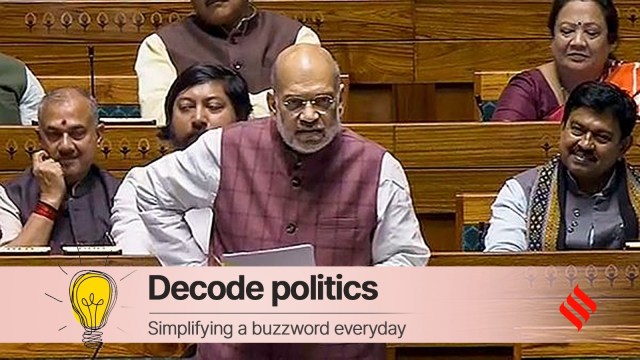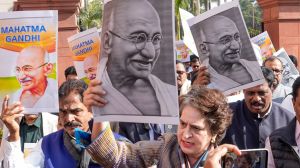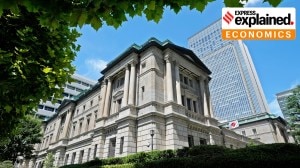Earlier this week, Union Home Minister Amit Shah, while responding to the Opposition during a debate on a Bill on the status of Jammu and Kashmir, reiterated an old Jana Sangh slogan: “Ek desh mein do vidhan, do pradhan aur do nishan nahin ho sakte (In one nation, there can’t be two Constitutions, two PMs and two flags).”
Faced with queries on the abrogation, Shah was trying to underline the ideological commitment of the BJP — which it carries from its precursor Bharatiya Jana Sangh — to the complete integration of Jammu and Kashmir with the Union of India. The home minister made the remark while responding to Trinamool Congress (TMC) MP Sougata Roy who had said that Article 370 was revoked in 2019 to fulfil a political idea of Jana Sangh founder Syama Prasad Mookerji.

What’s behind J&K’s special status?
After India and Pakistan came into being, the UN Security Council Resolution 47 asked both countries to demilitarise so that a plebiscite could be held to determine the wishes of the people of Jammu and Kashmir. Since demilitarisation never happened on either side, the resolution remained a dead letter. India considers the entire Jammu and Kashmir an integral part of the country.
However, the Jawaharlal Nehru government thought that Muslim-majority Kashmir required special constitutional provisions. To institutionalise this, Article 370 gave Parliament powers only on defence, foreign affairs and communication in the case of Kashmir. Beyond these three heads, Indian laws would not apply to J&K. Indians from outside the state needed a special permit to visit it and they were barred from buying land in the state.
Under this arrangement, J&K Prime Minister Sheikh Abdullah of the National Conference abolished big land holdings in 1951 under the Big Landed Estates Abolition Act without giving any compensation, a move that hit hard the landowning Hindu Dogras. He also adopted Urdu as the official language.
This sparked an agitation against Sheikh Abdullah by the Praja Parishad of Prem Nath Dogra, a former RSS swayamsevak and civil servant from Jammu. In Parliament, the Jana Sangh raised the issue of the arrest of Dogra and his followers after a clash with the state police. Later, the Jana Sangh also opposed the adoption of a flag for the state by the Constituent Assembly of Jammu and Kashmir.
Who coined the slogan?
Story continues below this ad
On June 26, 1952, Mookerjee pressed the Centre to convince J&K to accept full integration with India. This is when the Jana Sangh and the Praja Parishad adopted the slogan.
As controversies kept flaring up, the Centre’s tolerance for Sheikh Abdullah began to wane. The two governments signed the Delhi Agreement in July 1952, wherein the state accepted the original jurisdiction of the Supreme Court in matters of Centre-state disputes and on Fundamental Rights, and accepted its appellate jurisdiction in all civil and criminal cases. It also accepted the supremacy of the Indian flag, though the state’s flag would remain in use. It further accepted the President’s power to declare a state of Emergency in the state under Article 352 in the event of internal disturbances, subject to the concurrence of the state.
How did the BJP keep Kashmir central to its agenda?
BJP leaders such as L K Advani and Arun Jaitley often claimed credit for “pressure from the Jana Sangh” for this early gain towards the integration of Kashmir into India.
Story continues below this ad
However, the Praja Parishad rejected the Delhi Agreement and, by October 1952, was planning an agitation if the J&K Constituent Assembly decided to elect its head of state. It launched an agitation when the Assembly, by now the Legislative Assembly, elected Karan Singh as head of the state (Sadr-e-Riyasat) in November 1952. Dogra and other leaders of the Praja Parishad were again arrested.
At its first annual session in Kanpur in December 1952, the Jana Sangh demanded a round-table conference involving representatives of the Praja Parishad, the government of J&K, and Union government leaders, failing which it warned of an all-India agitation for J&K’s full integration into India.
What was Syama Prasad Mookerji’s role?
Accompanied by Atal Bihari Vajpayee, Mookerjee visited Jammu in May 1953 without a permit, which was a symbolic protest against the special status of Kashmir. They went by train to Pathankot in Punjab and then crossed the Ravi by road into J&K on May 11, 1953. The police arrested him.
In his recent biography of Vajpayee, Abhishek Choudhary writes that Mookerji told Vajpayee to return to Delhi and spread the word that he had entered J&K without a permit, if only as a prisoner. Mookerji was kept in a cottage about eight miles from Srinagar, where he suddenly suffered a massive heart attack and died on June 23.
Story continues below this ad
Over the years, Advani recalled in his speeches that when a journalist in Rajasthan informed him that Mookerji was no more, the Jana Sangh plunged into deep mourning. This gave the Jana Sangh someone it could project as a martyr for the cause of integrating Kashmir. In allied RSS organisations, there is a popular slogan: “Jahaan hue balidaan Mookerji, wo Kashmir hamara hai (where Mookerji was martyred, that Kashmir is ours).”
































